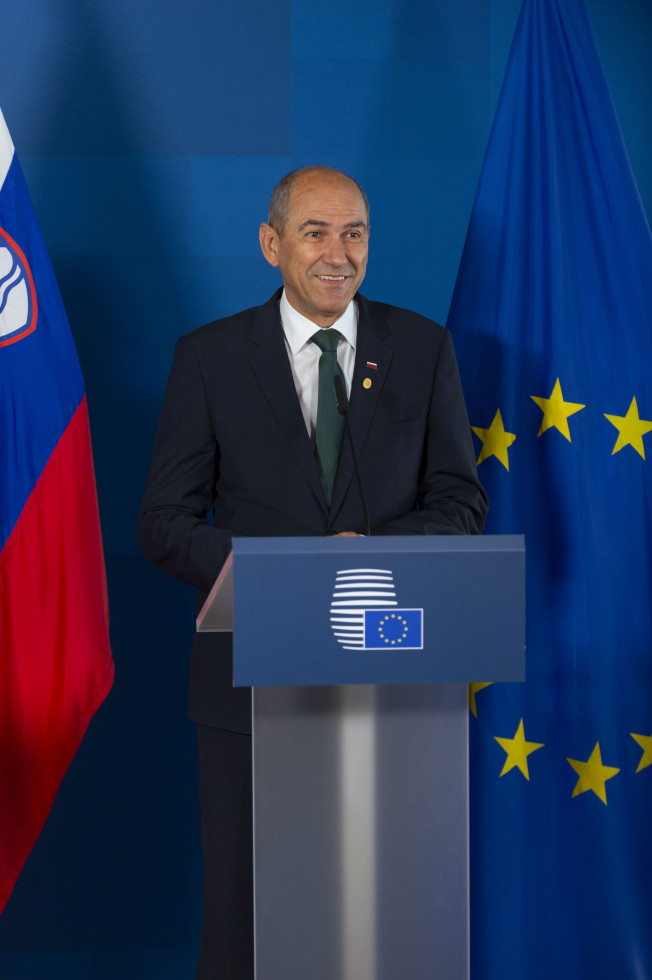Prime Minister Janez Janša: It is strongly in the interest of all Member States that the recovery and resilience facility be implemented as quickly as possible
- Former Prime Minister Janez Janša (2020 - 2022)
After the meeting, the prime minister stated that today’s European Council meeting was dedicated to a great extent to exchanging information regarding Covid-19. “Europe is in the second wave, which is probably still the summer wave, and our concern is primarily focused on the cold period in the coming months, when we will also have flu and other diseases here, and this exchange of information, at least for me, was extremely useful in terms of planning the upcoming measures,” Janša said, and added that the topic also arose at the end of the meeting, and that the discussion will be continued at the next meeting of the European Council.
PM Janša said that the European leaders also received information about when a vaccine might be available. “This information is highly conjectural, but almost certainly we cannot expect [a vaccine] before the end of this year or even next spring, at least not in sufficient quantities, and therefore serious preparations for the cold season with the coronavirus are all the more important, and this goes for practically all of the EU Member States,” said the prime minister.
The next major topic, which did not receive a great deal of attention, but which is extremely important from the point of view of Slovenia’s presidency of the European Union next year, is the chapter on the digital single market and economic measures. “I am speaking about working towards the EU’s increased resilience with respect to the experiences we gained during the epidemic in the spring, in terms of the formation of a strategy for strengthening Europe’s resilience in the face of similar risks or other emergencies, during which Europe can no longer be dependent on others in the future as it was in the spring and partially even now,” said the prime minister, who added that this involves relocating manufacturing capacities back to Europe, and the issue of the development of our own scientific and economic capacities, “so that we will be capable of producing everything that has to be available immediately in situations similar to what we experienced in the last pandemic.” “These resolutions significantly ease our preparations for the presidency in the second half of the coming year,” said the prime minister, who noted that this is also one of the key priorities of our presidency, and will undoubtedly continue into the future, as it involves substantial restructuring, the full extent of which we do not yet know.
“The discussion yesterday showed that the European Union, despite the doubts and differences, is capable of protecting its interests, which are the interests of all of us together and each Member State separately, in this specific case Greece and Cyprus,” said the prime minister with regard to the situation in the Eastern Mediterranean, and added that in his experience this was the first time that the matter had been discussed to the end, and that “we not only came to the published conclusions, but it [became] clear what will happen if developments in the Mediterranean move in a positive direction and what will happen if they move in a negative one. We will return to this topic in December, and after yesterday’s discussion it is also clear what the people responsible have to prepare for both options for the December meeting,” said the prime minister.
He also said that the discussion about Belarus was shorter, “because there were fewer dilemmas.” “The measures adopted are decisive but leave the door open to a certain dialogue, which has so far been rejected by the Belarusian authorities,” said the prime minister, adding that after the discussion it was also clear what the EU’s next steps will be within the framework of what it actually has at its disposal.
“We were unanimous in our condemnation of the poisoning of Russian opposition leader Navalny,” said the prime minister, and stated that the leaders had received specific information about the entire matter, which leaves no doubt about the matter, although certain analyses are still to be done. “In this case an unacceptable means was used to silence a critical voice,” said the prime minister, and added that it also involves the use of a reprehensible method considered as such since the beginning of human history, and sharp responses are therefore all the more necessary.


